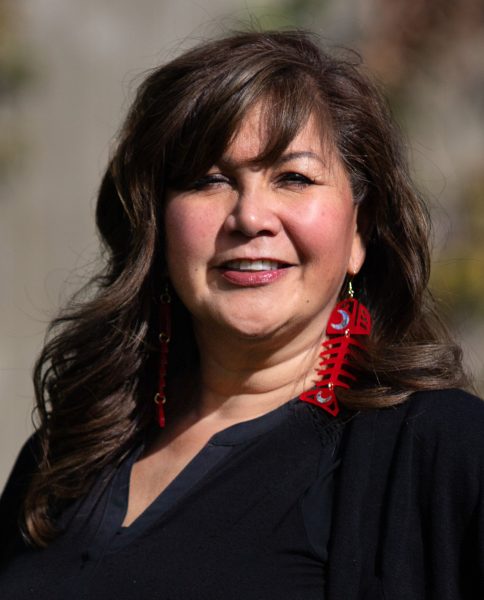By Kim Van Haren
TRU’s Coyote Project is a transformative Indigenization initiative that fosters a more inclusive, diverse and respectful academic environment that benefits students, staff and faculty, and the communities beyond the university. Once a month for the next few months, we’ll feature five compelling stories that delve into the heart of the Coyote Project, highlighting its innovative approaches and profound impacts.
Initiated to strengthen Indigenization at Thompson Rivers University (TRU), the Coyote Project has improved connections and understanding throughout the university and to communities beyond.
“The Coyote Project began in 2017 with Dean Airini and has grown into an amazing project that supports Indigenization and decolonization efforts at TRU and connects the university with the surrounding Indigenous communities in meaningful and powerful ways,” says Tina Matthew, executive director of the TRU Office of Indigenous Education.
The university-wide initiative — focused on Indigenization efforts to support the recruitment, retention and success of Indigenous students — includes representatives from the university’s nine academic faculties and schools, and from the Library, Open Learning and TRU World.
Putting discussion into action

Tina Matthew, executive director of the Office of Indigenous Education
Through the Coyote Project, the university has taken a focused approach to decolonization and Indigenization as well as responding to the Truth and Reconciliation Commission’s 94 Calls to Action and the United Nations Declaration on the Rights of Indigenous Peoples (UNDRIP). This is in addition to the numerous initiatives, projects, curriculum, research and partnerships also taking place across the university.
“We have been supporting and working with the university to embed the Truth and Reconciliation Commission’s 94 Calls to Action into all levels of what we do at the university,” says Matthew, who took the lead on the Coyote Project in 2021.
Coyote is core funded with $240,000 per year, which provides each faculty, school or department $15,000 annually for hosting conferences, course and program development resources, research, or collaborations with Indigenous communities. A positive outcome for the Coyote Project work is the development of faculty and department led decolonization and Indigenization committees and working groups. These are faculty-led and puts Indigenization and decolonization discussion into action.
Matthew says support from TRU senior administration for decolonization and Indigenization efforts is crucial for this project to succeed and, at the end of the day, it supports Indigenous students, staff and faculty and communities in meaningful and impactful ways.
Partnerships and collaboration
In her time leading the Coyote Project, Matthew has seen a dramatic increase in understanding of TRU’s relationship with its first house Tk’emlúps te Secwépemc, its second house T’exelc and all of the Indigenous nations TRU works with and serves in regard to decolonization and Indigenization.
“Many faculties, departments and divisions have implemented specific measures within their departments to address Indigenous student educational achievement, barriers, access and course completion, and we have witnessed an increase in Indigenous courses and programs,” she says.
“Relationships between Tk’emlúps te Secwépmc (in Kamloops) and T’exelc (in Williams Lake) have experienced unprecedented partnerships and collaboration. Research with surrounding Indigenous communities and nations has increased as research and relationships have extended outward into the region.”
Matthew looks forward to Coyote continuing to make inroads — in Indigenization and relationship building, as well as ensuring Indigenous students feel they belong at TRU.
“The future of Indigenization and decolonization looks brighter for TRU as the Office of Indigenous Education grows and increases their capacity for collaboration across the university and with our host nations,” she says.
* Indigenous students are those who self-identify as First Nations, Métis or Inuit. According to TRU’s most recent numbers, 10 per cent of students identify as Indigenous — more than 2,700 full- and part-time students.

